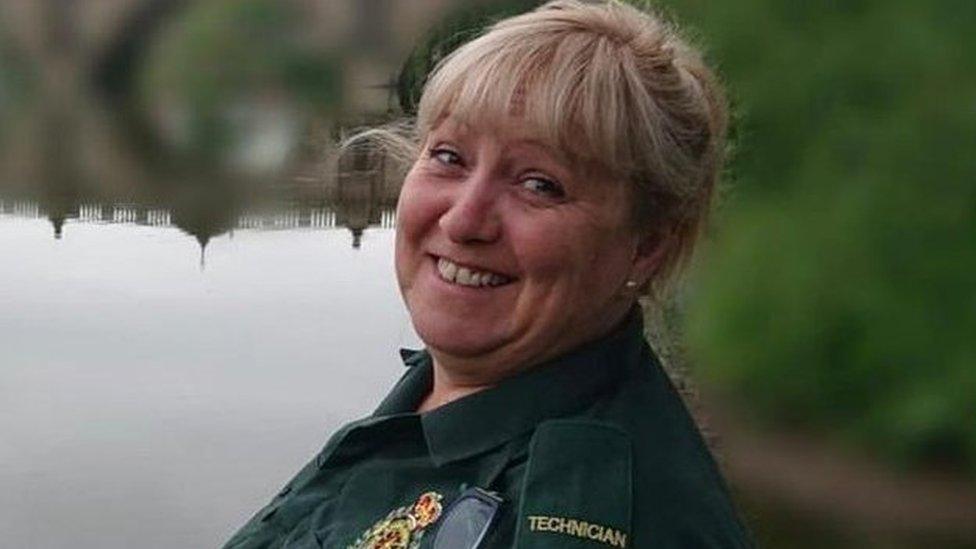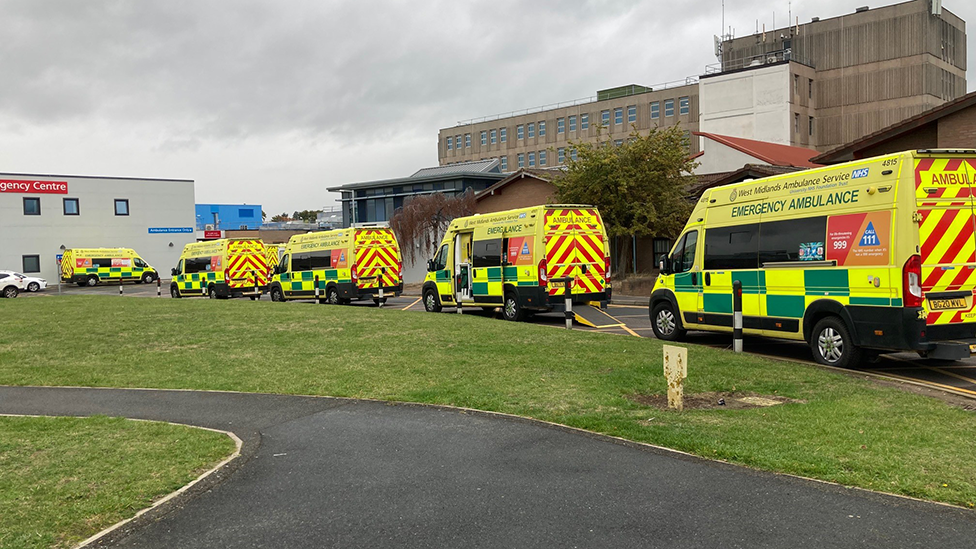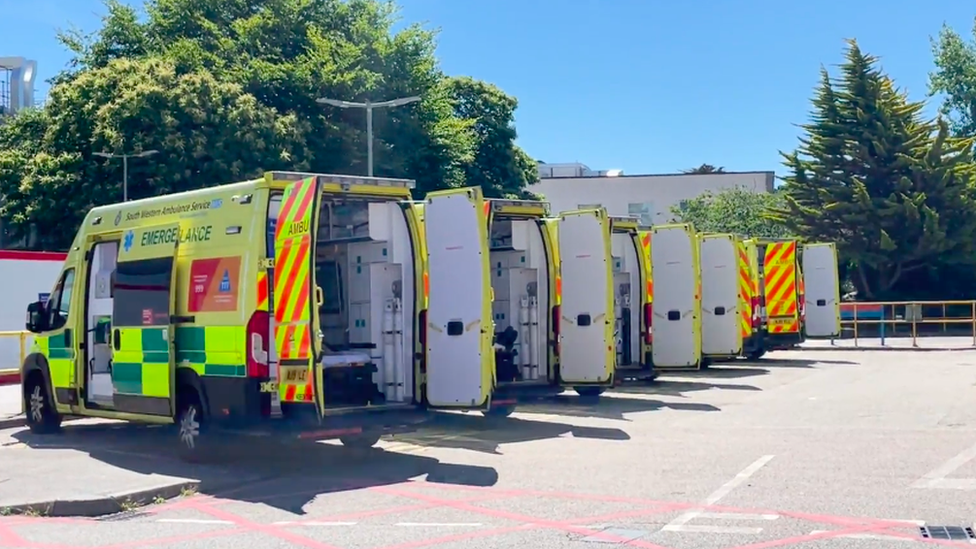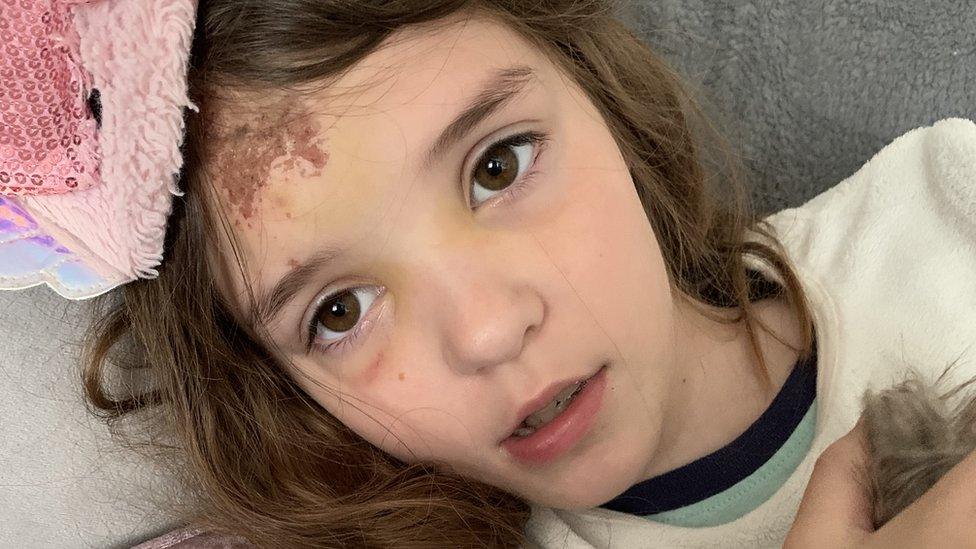West Midlands Ambulance crews left stuck outside hospitals
- Published

Tracy Jones works at the Shrewsbury ambulance hub
Ambulance crews sometimes spend an entire shift without responding to a 999 call due to delays in handing over patients, a paramedic has said.
Pressure on the NHS means they can be stuck outside A&Es for hours, Tracy Jones, who works for West Midlands Ambulance Service in Shropshire, said.
Paramedics can be caring for a number of patients at a time, she added.
On Wednesday, 22 of 34 ambulances in service across Shropshire were outside hospitals, WMAS figures showed.
Hospital trusts across England have said pressure on A&E departments and bed shortages have led to delays in accepting patients from ambulances.
Nick White, chief medical officer for NHS Shropshire, Telford and Wrekin, said increased support and monitoring was being provided after record patient numbers in A&E across the NHS last year, the highest ever number of the most serious ambulance call-outs in the summer, and now a busy winter ahead.
'Stress and pressure'
"The main pressure is the delays in getting to patients," Ms Jones said.
"That puts an enormous amount of stress on myself and my colleagues, when you know the patient you're going to has been waiting possibly for hours.
"Also the stress and pressure of being sat outside for hours, knowing that there are other patients waiting."
Ms Jones said she knew of colleagues who had endured waits outside hospitals of up to eight hours for a patient to be allowed in for treatment.

Nine ambulances were sitting outside the Royal Shrewsbury Hospital on Wednesday afternoon
Figures from WMAS show the problem has deteriorated considerably since the summer of 2021.
In September 2019, the service as a whole lost a total of 6,259 hours through ambulances being stuck at hospitals waiting to hand over patients. In September 2022, the equivalent figure was 36,750.
Ms Jones described how the strain on hospitals meant ambulance staff often had to look after a number of patients at a time - known as cohorting - and hospitals were now creating a dedicated area for them to do so.
'Hospital's hands tied'
She said that meant when some ambulance crews finish their shifts, others had to look after the patient until they could be handed over to hospital teams.
"So we'll take their patient and look after that patient along with our own, and sometimes you can spend the whole shift cohorting patients, so you don't actually respond to an emergency call, you just spend the whole shift looking after patients who are waiting to be admitted," Ms Jones said.
"The NHS is under so much pressure and it's equally difficult for them, because you can see the ambulances outside, you can see the patients, but they can't do anything about it.
"What we do now is we have a cohort area in the hospital so patients do physically get inside the hospital and that means one ambulance crew can look after up to five patients rather than one crew for one patient outside.
"It means my colleagues are taking on the role of porter, nurse, healthcare assistant, but it's all for the good of the patient and it's all because the hospital's hands are tied.
She said colleagues working in A&E were as equally frustrated.
She added that patients deemed lower priority could be waiting up to eight or nine hours for an ambulance to arrive.
Mr White said partners across the health and social care system were working together and prioritising patients with the highest level of need.
"As a system we have been working on our winter plan and have begun implementing some specific interventions to create further capacity across the system," he said.
Councillors Simon Jones and Andy Burford, respective leads on Shropshire and Telford and Wrekin councils for adult social care and health, said teams were working together to get people discharged from hospitals more quickly.
"Nationally, social care services are facing significant challenges this winter and this is reflected in Shropshire, Telford and Wrekin," they said.

Follow BBC West Midlands on Facebook, external, Twitter, external and Instagram, external. Send your story ideas to: newsonline.westmidlands@bbc.co.uk, external
- Published15 July 2022

- Published12 May 2022
